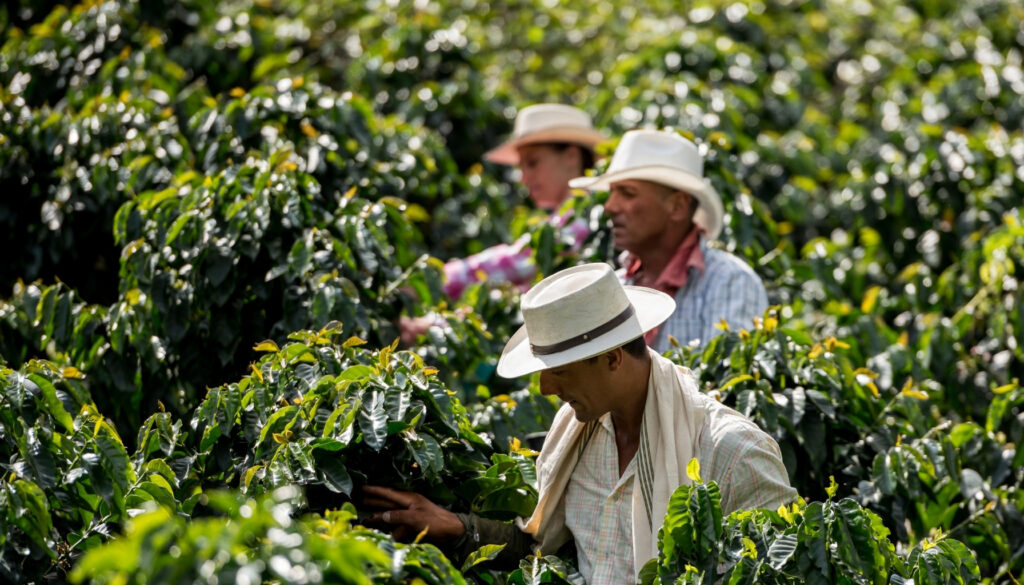Coffee has long held a revered place in global culture, transcending mere beverage status to become a sophisticated experience and passion for enthusiasts. As the world continues to evolve, coffee cultivation undergoes a remarkable transformation. This article delves into the latest techniques, innovations, and trends that are reshaping the industry. From cutting-edge farming methods to the emergence of new varietals, coffee lovers are discovering a world of exquisite flavors and sustainability in their daily cup.
1. The Rise of Sustainable Coffee Farming
As climate change poses a significant threat to traditional coffee cultivation, farmers increasingly adopt sustainable practices to safeguard their crops. These methods emphasize eco-friendly approaches that significantly reduce the environmental impact of coffee production. For instance, shade-grown coffee not only supports biodiversity but also enhances flavor profiles. By growing coffee plants under the canopy of trees, farmers create a balanced ecosystem that promotes healthier beans.
Moreover, sustainable coffee farming minimizes the use of chemical fertilizers and pesticides. Instead, farmers explore organic methods, promoting soil health through natural compost and crop rotation. This shift not only benefits the environment but also leads to superior coffee quality, appealing to discerning connoisseurs.
1.1. Organic Practices and Certification
Organic coffee cultivation has gained immense popularity among consumers seeking healthier, environmentally friendly options. Organic farming practices prioritize soil health and biodiversity, promoting sustainable ecosystems. By using natural fertilizers and pest control methods, organic farmers ensure a low-impact approach to coffee cultivation.
Furthermore, organic coffee often boasts appealing flavor profiles, characterized by vibrant acidity and rich sweetness. As coffee drinkers become more discerning, they seek out organic options that align with their values and preferences. This trend supports responsible farming practices while offering consumers peace of mind.
2. Innovative Cultivation Techniques
Farmers now leverage technology to optimize coffee cultivation. Precision agriculture offers tools such as soil moisture sensors and drones that monitor crop health. These tools enable farmers to apply resources more efficiently, potentially increasing yields and reducing waste.
Additionally, vertical farming is gaining traction as an innovative solution. By growing coffee plants in stacked layers, farmers maximize space and increase productivity. This method also allows for controlled environments, enhancing flavor profiles by regulating factors like humidity and temperature.
2.1. Using Technology for Data-Driven Decisions
Technological advancements have revolutionized how farmers manage their crops. Now, apps and software programs offer insights into various metrics, from weather conditions to market trends. By harnessing data analytics, coffee producers can make informed decisions that enhance productivity and quality.
Automation also plays a pivotal role in modern coffee farming. Robotic systems assist with tasks such as planting, harvesting, and processing, leading to increased efficiency and reduced labor costs. As technology evolves, it holds the potential to revolutionize coffee cultivation even further.
3. The Emergence of New Coffee Varietals
The quest for unique and flavorful coffee has led to the development of new varietals. Breeders experiment with hybridization to create beans that boast distinct flavor notes and higher resistance to diseases. Varietals like Geisha and SL28 have become favorites among aficionados, credited with captivating profiles.
New varietals often originate from regions traditionally overlooked. For example, coffee from Yemen has gained recognition for its rich flavors, thanks in part to a renewed interest in ancient varietals. This exploration of lesser-known regions excites connoisseurs while promoting cultural appreciation.
3.1. The Role of Genetic Diversity
Maintaining genetic diversity within coffee crops is essential for resilience. Farmers increasingly recognize that diverse varietals can better withstand pests, diseases, and changing climatic conditions. By planting a mix of varietals, coffee growers enhance overall crop health and longevity. This genetic diversity not only benefits farmers but also supports the broader coffee community as it adapts to future challenges.
4. Agroforestry: Blending Coffee with Nature
Agroforestry is becoming increasingly popular in coffee cultivation. This method integrates coffee plants with trees and other crops, fostering biodiversity and sustainability. The practice creates habitats for wildlife while simultaneously enhancing soil health through organic matter and nutrient recycling.
In addition to environmental benefits, agroforestry can improve coffee quality. The natural shade provided by trees protects coffee plants from extreme weather conditions, resulting in a more consistent and flavorful product. As consumers prioritize quality, the agroforestry approach resonates with their desires for ethically sourced coffee.
4.1. The Ecosystem Approach
By adopting an ecosystem approach, coffee farmers can enhance the overall health of their farms. This method includes planting native plants alongside coffee crops, promoting beneficial insect populations that control pests. Furthermore, this approach often leads to improved soil quality and microclimate regulation. By working with nature rather than against it, coffee producers can achieve sustainable yields and preserve the environment.
5. Climate Resilience: Adapting to a Changing Environment
The coffee industry faces unprecedented challenges due to climate change. Rising temperatures and erratic rainfall patterns threaten traditional coffee-growing regions. However, farmers innovate to adapt to these changes, ensuring the future of coffee cultivation.
One strategy involves selecting climate-resilient varietals that thrive in warmer conditions. For example, researchers develop hybrids that retain desirable flavor characteristics while tolerating heat and drought. As a result, coffee cultivators can maintain quality and quantity amid changing environmental conditions.
5.1. The Importance of Research and Development
Investing in research and development is crucial for the future of coffee cultivation. Organizations and universities collaborate with farmers to study the effects of climate change on coffee crops. By conducting trials and sharing knowledge, these partnerships help growers identify suitable varietals and practices that promote resilience. This ongoing research bolsters the industry’s adaptability and sustainability.
6. The Role of Technology in Coffee Cultivation
Technological advancements continue to revolutionize coffee cultivation. Farmers now utilize apps and software to analyze data related to crop health, weather forecasts, and market trends. By harnessing data analytics, coffee producers can make informed decisions that enhance productivity and quality.
Automation also plays a pivotal role in modern coffee farming. Robotic systems assist with tasks such as planting, harvesting, and processing, leading to increased efficiency and reduced labor costs. As technology evolves, its potential to revolutionize coffee cultivation grows even more.
6.1. Innovations in Processing
Technological innovations extend beyond cultivation. In processing, advancements such as digital fermentation monitoring and improved drying techniques enhance coffee quality. These technologies ensure that flavor profiles are preserved during processing, leading to a superior end product. As a result, consumers enjoy a fresher, more vibrant coffee experience.
7. Direct Trade: Building Relationships with Farmers
The direct trade model has emerged as a prominent trend in the coffee industry. This approach fosters direct relationships between producers and consumers, ensuring that farmers receive fair compensation for their quality beans. By eliminating intermediaries, direct trade empowers farmers and promotes transparency.
Additionally, consumers benefit from this model by gaining access to unique, high-quality coffees. By engaging with specific farms, coffee enthusiasts can learn about the origins of their beans, enhancing their appreciation of the craft. This relationship strengthens community ties and supports sustainable farming practices.
7.1. Transparency in Sourcing
Consumers increasingly desire transparency in their coffee’s sourcing. Brands that practice direct trade often provide detailed information about their partnerships with farmers, including their ethical practices and pricing structures. This transparency fosters trust among consumers, who appreciate knowing the impact of their purchases on coffee-growing communities.
8. Coffee Terroir: A New Frontier of Flavor
The concept of terroir, often associated with wine, is making its mark in the coffee world. Terroir refers to the unique environmental conditions that influence a crop’s characteristics, including soil, climate, and altitude. As coffee cultivators pay closer attention to terroir, the flavor profiles of their beans become more complex and nuanced.
For instance, coffees grown at high altitudes often develop vibrant acidity and intricate flavors. Similarly, distinct soil compositions can yield vastly different taste experiences. Coffee connoisseurs are now keenly aware of these variations, leading to a greater appreciation for the artistry involved in coffee cultivation.
8.1. The Impact of Local Farming Practices
In addition to environmental factors, local farming practices also contribute to terroir. Traditional methods, such as the way beans are harvested and processed, play a significant role in shaping a coffee’s final flavor. As consumers explore coffees from different regions, they gain insights into how culture and tradition influence taste profiles.
9. The Benefits of Organic Coffee Cultivation
As mentioned previously, organic coffee has gained immense popularity among consumers looking for healthier, environmentally friendly options. Organic farming practices prioritize soil health and biodiversity, promoting sustainable ecosystems. By using natural fertilizers and pest control methods, organic farmers ensure a low-impact approach to coffee cultivation.
Moreover, organic coffee boasts appealing flavor profiles, often characterized by vibrant acidity and rich sweetness. As coffee drinkers become more discerning, they seek out organic options that align with their values and preferences. This trend not only benefits consumers but also supports responsible farming practices.
9.1. Market Demand for Organic Coffee
The rising demand for organic coffee has prompted many farmers to transition from conventional to organic practices. This shift not only satisfies consumer preferences but also improves environmental outcomes. By investing in organic certification, producers gain access to premium markets that offer better financial returns.
10. Specialty Coffee: Crafting Artisanal Experiences
The specialty coffee movement has redefined the industry, emphasizing quality and craftsmanship. This trend involves meticulous cultivation, processing, and brewing methods that elevate coffee to an art form. Specialty coffee growers often engage in innovative cultivation techniques, showcasing their dedication to excellence.
Furthermore, specialty coffee shops have emerged as cultural hubs, offering curated experiences for coffee enthusiasts. These establishments often prioritize single-origin beans, allowing consumers to explore diverse flavor profiles. As a result, the appreciation for quality coffee continues to grow, driving demand for small-batch, artisanal products.
10.1. The Art of Brewing
Brewing methods also play a crucial role in the specialty coffee experience. Techniques such as pour-over, siphon brewing, and espresso extraction showcase the nuances of flavor in each coffee variety. As consumers become more knowledgeable about brewing methods, they seek out equipment and training that enhance their coffee experiences at home.
11. The Coffee Supply Chain: Transparency and Ethical Practices
In recent years, transparency in the coffee supply chain has become a pressing concern for consumers. Coffee lovers increasingly desire to know the origins of their beans, including the ethical practices involved in their production. As a result, many coffee brands are adopting transparency initiatives, providing detailed information about their sourcing and production processes.
This focus on ethical practices not only benefits consumers but also empowers farmers. By establishing direct relationships and ensuring fair wages, brands can contribute to the well-being of coffee-growing communities. The emphasis on transparency fosters trust and loyalty among consumers, promoting a more sustainable industry.
11.1. Fair Trade and Its Impact
Fair trade initiatives have emerged as a mechanism to support ethical practices in the coffee industry. By certifying producers who meet specific labor and environmental standards, fair trade programs ensure that farmers receive fair compensation for their work. Consequently, consumers can make informed choices that align with their values while supporting sustainable practices.
12. Water Conservation in Coffee Cultivation
Water scarcity remains a significant challenge for coffee growers worldwide. As such, many adopt innovative techniques to conserve water in the cultivation process. Practices like rainwater harvesting and drip irrigation allow farmers to optimize their water usage, promoting sustainability.
Moreover, these approaches can lead to better flavor characteristics in coffee beans. When farmers utilize controlled irrigation methods, they can manage water stress, resulting in enhanced quality. As water conservation becomes increasingly critical, these methods may become standard practices in the coffee industry.
12.1. Rainwater Harvesting Techniques
Rainwater harvesting techniques are particularly valuable for coffee farmers in regions with variable rainfall patterns. By collecting and storing rainwater, farmers can ensure a consistent water supply during dry spells. This approach not only maximizes resource efficiency but also protects surrounding water sources, contributing to a healthier ecosystem.
13. Innovative Coffee Processing Techniques
Processing techniques play a vital role in shaping coffee’s flavor profile. Recently, innovative methods such as anaerobic fermentation and honey processing have gained traction among coffee producers. Anaerobic fermentation allows coffee cherries to ferment without oxygen, resulting in unique and complex flavors.
Honey processing, on the other hand, involves removing only part of the cherry’s outer skin while allowing some mucilage to remain. This method enhances sweetness and body while maintaining acidity. As farmers experiment with various processing methods, they create distinctive coffee experiences that tantalize the taste buds of connoisseurs.
13.1. The Role of Fermentation
Fermentation’s role in coffee processing is gaining recognition among producers and consumers alike. By controlling fermentation conditions, producers can influence acidity, sweetness, and overall flavor complexity. This experimentation reflects a growing appreciation for the intricacies involved in coffee production.
14. The Impact of Social Media on Coffee Culture
Social media has transformed how coffee enthusiasts connect and share their passion. Platforms like Instagram provide a visual outlet for coffee lovers to showcase their favorite brews and café experiences. This trend has led to the rise of coffee influencers and specialty shops that curate aesthetically pleasing presentations.
Moreover, social media plays a pivotal role in promoting new trends and innovations. As consumers discover unique coffee experiences online, they seek out rare beans and artisanal techniques. This dynamic interaction between social media and coffee culture fosters a sense of community among enthusiasts.
14.1. Building Community Through Social Media
Social media platforms enable coffee lovers to engage with one another like never before. By sharing experiences, recipes, and brewing tips, individuals contribute to a collective knowledge base that benefits the entire community. This sense of belonging enhances the overall coffee experience and fosters a culture of exploration.
15. The Future of Coffee Farming: Indoor and Urban Cultivation
As urbanization continues to rise, indoor and urban coffee cultivation gains momentum. Innovative hydroponic and aeroponic systems enable growers to cultivate coffee plants in controlled environments, regardless of geographical location. This trend not only offers opportunities for urban agriculture but also reduces the carbon footprint associated with transportation.
Consumers increasingly embrace this development, as it promises fresher beans with minimal environmental impact. Urban coffee cultivation fosters community engagement, allowing individuals to connect with their food sources. This modern approach to farming aligns with the growing desire for sustainable practices.
15.1. Urban Gardening Initiatives
Urban gardening initiatives that include coffee cultivation promote local food sources and enhance community resilience. By encouraging residents to participate in coffee-growing projects, cities can foster a greater appreciation for agricultural practices and sustainable living. These initiatives not only provide fresh coffee but also promote social interaction and environmental stewardship.
16. Education and Training in Coffee Cultivation
Education plays a crucial role in advancing coffee cultivation practices. Training programs for farmers focus on sustainable methods, quality improvement, and technology integration. By equipping farmers with the necessary skills, the industry can ensure a new generation of coffee cultivators dedicated to excellence.
Moreover, educational initiatives empower farmers to connect with consumers. By sharing their stories and expertise, producers can enhance consumer appreciation and foster loyalty. As education becomes more accessible, it paves the way for a brighter future in coffee cultivation.
16.1. Workshops and Community Outreach
Workshops and community outreach programs provide valuable learning opportunities for both farmers and consumers. These events facilitate knowledge sharing, allowing participants to learn about sustainable practices and the importance of quality sourcing. By engaging with the broader community, coffee producers can promote a culture of awareness and appreciation.
17. Ethical Consumerism: The Rise of Supporter Brands
As consumers become more conscious of their purchasing decisions, the demand for ethical brands rises. Supporter brands champion fair trade practices, ensuring that farmers receive equitable compensation for their labor. This trend aligns with the values of coffee enthusiasts seeking authenticity and responsibility in their sourcing.
Consumers are increasingly drawn to brands that prioritize social and environmental sustainability. By supporting these brands, coffee lovers can contribute to positive change in coffee-growing communities. This shift in consumer behavior fosters a culture of awareness and accountability in the industry.
17.1. The Role of Certifications
Certifications such as Fair Trade and Rainforest Alliance have become essential for ethical brands. These labels provide assurance to consumers that their coffee choices support sustainable practices. As a result, consumers can make informed decisions that reflect their values while supporting coffee producers committed to ethical practices.
18. The Global Impact of Coffee Cultivation Innovations
Innovations in coffee cultivation extend beyond individual farms; they have the potential to reshape entire economies. Regions that rely heavily on coffee production can benefit from advancements in sustainable practices, technology, and education. As farmers adopt these innovations, they can improve their livelihoods and strengthen local communities.
Additionally, these advancements contribute to global efforts to combat climate change. By implementing sustainable practices, coffee producers can reduce their carbon footprints and enhance biodiversity. This positive impact resonates with conscious consumers who prioritize environmental stewardship in their choices.
18.1. Strengthening Local Economies
Investing in sustainable coffee cultivation not only benefits farmers but also supports local economies. By promoting fair trade practices and supporting community initiatives, coffee producers can positively impact the broader economic landscape. As local communities thrive, they become more resilient in the face of global challenges.
19. The Indulgent Experience of Coffee Tastings
For coffee enthusiasts, the tasting experience transcends mere consumption; it becomes an indulgent journey of flavor exploration. Specialty coffee tasting events attract connoisseurs eager to savor rare beans and share their insights. These gatherings create a sense of camaraderie among coffee lovers, fostering a community grounded in appreciation.
Professional cuppers conduct tastings with meticulous attention to detail, focusing on aroma, acidity, body, and flavor notes. This immersive experience deep


